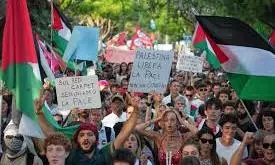
Over 1800 Hollywood artists pledge boycott of Israeli film institutions over Gaza crisis
text_fieldsMore than 1,800 Hollywood actors, directors, and film professionals have pledged to boycott Israeli film institutions in protest against Israel’s actions in Gaza.
The pledge, organised by Film Workers for Palestine, condemns the role of Israeli film bodies in what they describe as genocide and apartheid against Palestinians.
Signatories include well-known actors like Emma Stone, Olivia Colman, Mark Ruffalo, Joe Alwyn, and Riz Ahmed.
They have committed not to screen films, participate in events, or collaborate with Israeli festivals, cinemas, broadcasters, and production companies that are accused of supporting or covering up atrocities against Palestinians.
The pledge reads, “Inspired by Filmmakers United Against Apartheid who refused to screen their films in apartheid South Africa, we pledge not to screen films, appear at or otherwise work with Israeli film institutions – including festivals, cinemas, broadcasters and production companies – that are implicated in genocide and apartheid against the Palestinian people.”
It cites the International Court of Justice’s description of Israel’s occupation and apartheid as “unlawful” and possibly genocidal.
Since October 2023, Israel’s military actions in Gaza have resulted in over 64,500 Palestinian deaths and more than 163,000 injuries. All healthcare facilities in Gaza have been destroyed, and aid entry is severely restricted, leading to systematic starvation, the advocacy group said.
The pledge accuses some institutions of complicity, including “whitewashing or justifying genocide and apartheid, and/or partnering with the government committing them.”
Jewish actors such as Ilana Glazer, Hannah Einbinder, Emma Seligman, and Wallace Shawn have also signed, expressing solidarity with Palestinians. Hannah Einbinder stated, “As a Jewish American citizen whose tax dollars directly fund Israel’s assault on Gaza, I feel we must do everything in our power to end the genocide. At this pivotal moment, given the failure of our leaders, artists have to step up and refuse complicity.”
The petition further noted, “We answer the call of Palestinian filmmakers, who have urged the international film industry to refuse silence, racism, and dehumanization, as well as to ‘do everything humanly possible’ to end complicity in their oppression.”
Hollywood’s longstanding bias in favour of Israel has often sidelined voices supporting Palestine. Stars like Melissa Barrera, Susan Sarandon, and Rachel Zegler have faced backlash for their pro-Palestinian posts. Meanwhile, outspoken supporters of Israel like Gal Gadot continue to work without major public criticism.
The boycott movement aligns with other initiatives, such as Publishers for Palestine’s campaign last year, which saw over 7,000 authors and industry professionals, including Khaled Hosseini, Sally Rooney, and Arundhati Roy, call for a boycott of Israeli literary institutions.
Recent films that highlight Palestine’s struggle have gained recognition. No Other Land, about the destruction of Masafer Yatta, won the Academy Award for Best Documentary. The Voice of Hind Rajab, which follows the killing of a Palestinian girl by Israeli soldiers, received a standing ovation at the Venice Film Festival.
In response, the Israeli Film and TV Producers Association claimed, “For decades, we Israeli artists, storytellers, and creators have been the primary voices allowing audiences to hear and witness the complexity of the conflict, including Palestinian narratives and criticism of Israeli state policies.”
However, the Film Workers for Palestine’s accompanying document refuted this, stating, “The vast majority of Israeli film production and distribution companies, sales agents, cinemas and other film institutions have never endorsed the full, internationally recognized rights of the Palestinian people.”
The campaign is rooted in the belief that, “Standing for equality, justice, and freedom for all people is a profound moral duty that none of us can ignore. We answer the call of Palestinian filmmakers urging the international film industry to refuse silence and complicity.”












